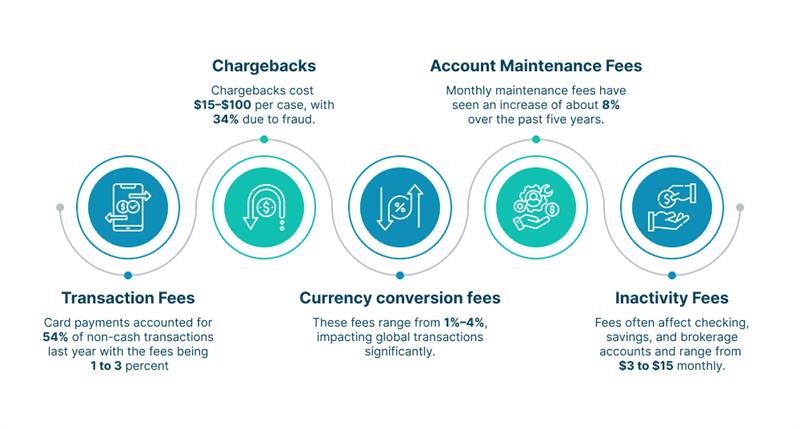Payment Reconciliation
The CFO's guide to eliminating fee discrepancies with smart payment reconciliation
Eliminate fee discrepancies and enhance financial accuracy with smart payment reconciliation strategies designed for CFOs and finance leaders.

Amrit Mohanty
Jun 24, 2025 (Last Updated: Oct 16, 2025)

Fee discrepancies that are related to payment reconciliation errors continue to be an operational and financial drain on organizations everywhere. In fact, almost 40% of the finance team’s time is spent on manual, inefficient reconciliation, resulting in potential losses of close to 0.5% of the year’s revenue from inefficiencies/delays on settlement. If that’s not bad enough, it’s estimated that 62% of companies are still using spreadsheets to perform their reconciliation, which puts them at significant risk of both errors and delays in reporting, creating challenges in managing compliance and cash flow. For CFOs, intelligent payment reconciliation safeguards profitability and efficiency—but building effective solutions requires more than just better systems or software.
Payment Reconciliation: The cornerstone of strategic CFO leadership
As the amount of information is increasing frequently and at a diverse pace, it’s now imperative for CFOs to implement solutions to efficiently track, reconcile, and maintain financial integrity for a variety of transactions. This allows them to reduce errors, improve compliance, manage cash flow, and minimize risk exposure while identifying strategic opportunities in today’s increasingly complex financial landscape.
A 2025 Trullion study found 73% of auditors still rely heavily on spreadsheets for reconciliations, data extraction, and outdated processes—leading to inefficiencies and higher error risk. Nearly 50% cited reconciliations as their biggest challenge, taking 5–20 hours weekly and delaying financial close. Despite automation potential, only one-third use AI. For CFOs, resolving fee discrepancies remains critical for profitability, compliance, and streamlined financial operations.
Reconciliation Insights: A closer look at fee discrepancies

- Transaction fees: Card payments accounted for 54% of non-cash transactions last year with the fees being 1 to 3 percent.
- Chargebacks: Chargebacks cost $15–$100 per case, with 34% due to fraud.
- Currency conversion fees: These fees range from 1%–4%, impacting global transactions significantly.
- Account maintenance fees: Monthly maintenance fees have seen an increase of about 8% over the past five years.
- Inactivity fees: fees often affect checking, savings, and brokerage accounts and range from $3 to $15 monthly
These discrepancies occur when the fees charged or recorded do not match the actual fees incurred or agreed upon. These discrepancies arise from several sources:
The impact of fee discrepancies on financial performance and compliance
Fee discrepancies have tangible financial and operational impacts:
- Profit margin erosion: Untracked chargebacks and currency fees significantly reduce net revenue. For example, chargebacks alone add substantial unexpected costs beyond the original transaction amount.
- Operational inefficiencies: Manual reconciliation processes, especially spreadsheet-based ones, are error-prone and time-consuming. This leads to delayed financial reporting and increased back-office workload.
- Regulatory risks: Inaccurate fee calculations can trigger regulatory actions, as seen in multiple SEC enforcement cases related to investment advisory fees.
- Client dissatisfaction: Lack of transparency and errors in fee billing can erode client trust, impacting long-term business relationships.
Leveraging smart payment reconciliation to eliminate fee discrepancies
Smart payment reconciliation solutions harness automation, intelligent matching, and seamless integration to address these challenges.
Key features of smart reconciliation solutions
- Intelligent transaction matching
Rule-based matching automates 2-way and 3-way reconciliation, handling complex scenarios such as single debit/multi-credit transactions and duplicate references. This reduces manual workload and improves accuracy.
- Seamless data integration
Ability to ingest diverse data formats (CSV, Excel, XML, databases) ensures reconciliation across multiple payment channels and systems without data loss or misalignment.
- Advanced categorization and exception handling
Categorizing transactions into matches, mismatches, duplicates, and missing entries allows for effective resolution of discrepancies.
- Automation of fee calculations and adjustments
Automated fee calculation engines reduce human error and ensure fees align with contractual terms and regulatory requirements.
Best practices for CFOs to implement smart reconciliation
- Establish clear and documented processes: Define responsibilities, timing, and tools for reconciliation. You should write down your processes for connecting the dots and making sure everyone in your organization is aligned with terminology and steps.
- Automate as much as possible: Use software tools to automate the data entry, matching, discrepancy flagging, etc. to free up your time for strategic decision-making.
- Regular fee reviews and audits: Independent and regular audit allows you to identify discrepancies as they happen, and ensures compliance with all contracts and regulatory guidelines.
- Collaborate across teams: When you develop fee agreements and the reconciliation process work with finance, compliance and legal teams to minimize oversight and misunderstandings while developing a process.
- Invest in training and education: Train your team on fee structures, reconciliation processes, and or any changes in regulations to drive accuracy while maintaining clarity and transparency.
Global market trends and future outlook
The global payment gateway market is expected to reach USD 161.0 billion by 2032 with revenues from hosted payments and non-hosted payments at USD 94.99 billion and USD 66.01 billion, respectively. The increasing complexity and magnitude of payment transactions warrant sophisticated reconciliation.
Additionally, the foreign exchange market is expected to grow at a 10.31% CAGR over the next five years, highlighting the increasing necessity to manage currency conversion fees correctly. Leading payment companies are helping streamline reconciliation workflows by leveraging smart automation tools, reducing their reliance on manual processes, which are more prone to errors.
Conclusion: empowering CFOs to drive financial accuracy and efficiency
For CFOs and finance professionals, mitigating discrepancies through smart payments reconciliation is not an opportunity, it is a requirement. Review mismatches negatively impacts profit margin health, introduces compliance risks based on the inconsistencies, and inefficiencies. Accepting smart payments reconciliation solutions and best practices help accounting departments limit mistakes, improve reporting time, and increase transparency for stakeholders.
As the global payments landscape rapidly evolves into what will likely be hundreds of billions in place value, CFOs that prioritize smart reconciliation will position their organizations to not just survive but thrive in the turbulent waters of competitive advantage.

